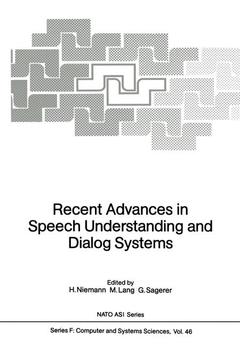This volume contains invited and contributed papers presented at the NATO Advanced study Insti tute on "Recent Advances in Speech Understanding and Dialog systems" held in Bad Windsheim, Federal Republic of Germany, July 5 to July 18, 1987. It is divided into the three parts Speech coding and Segmentation, Word Recognition, and Linguistic Processing. Although this can only be a rough organization showing some overlap, the editors felt that it most naturally represents the bottom-up strategy of speech understanding and, therefore, should be useful for the reader. Part 1, SPEECH CODING AND SEGMENTATION, contains 4 invited and 14 contributed papers. The first invited paper summarizes basic properties of speech signals, reviews coding schemes, and describes a particular solution which guarantees high speech quality at low data rates. The second and third invited papers are concerned with acoustic-phonetic decoding. Techniques to integrate knowledge sources into speech recognition systems are presented and demonstrated by experimental systems. The fourth invited paper gives an overview of approaches for using prosodic knowledge in automatic speech recogni tion systems, and a method for assigning a stress score to every syllable in an utterance of German speech is reported in a contributed paper. A set of contributed papers treats the problem of automatic segmentation, and several authors successfully apply knowledge-based methods for interpreting speech signals and spectrograms. The last three papers investigate phonetic models, Markov models and fuzzy quantization techniques and provide a transi tion to Part 2 .




